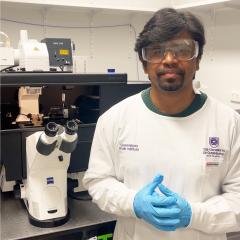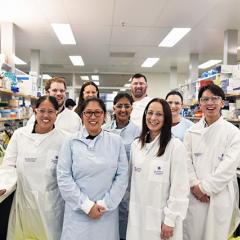Customised immune-blocking medication may be the key to treating patients with motor neurone disease (MND), which currently has no cure and limited therapeutic options.
University of Queensland researchers have tested immune cells that circulate in the blood to determine if they’re linked with specific characteristics and features of MND.
The team analysed immune cells from 23 healthy people and 48 patients with MND to measure differences in patients’ immune profiles.
Research assistant and UQ medical student Raquel McGill said their study showed certain immune cells were associated with distinct MND features, including impaired swallowing, speech and breathing, as well as disease severity and rate of progression.
“A challenging aspect of MND treatment is the diverse nature of the disease; many MND patients present and progress differently,” Ms McGill said.
“Prior research has identified the immune system as a possible key factor in the progression of MND, but what drives the different MND types is less clear.
“Our findings show that abnormal immune cells in the blood are linked with a MND patient’s clinical characteristics and disease progression.”
UQ School of Biomedical Sciences lead author Professor Trent Woodruff said the research also suggested that immune-blocking drugs could be personalised to treat each patient’s unique disease symptoms and stages.
“There are several immune-targeted drugs currently progressing to human clinical trials, including UQ’s own discoveries,” Professor Woodruff said.
“Our findings may help with patient selection for these trials, which could lead to improved outcomes.”
The study is published in Brain Communications (DOI: 10.1093/braincomms/fcaa013).
The researchers thank the funders, FightMND, Wesley Medical Research, NHMRC and the Queensland Government for making this study possible.
Media: Raquel McGill, r.mcgill@uq.edu.au; Professor Trent Woodruff, t.woodruff@uq.edu.au; Faculty of Medicine Communications, med.media@uq.edu.au, +61 7 3365 5133, +61 436 368 746.



